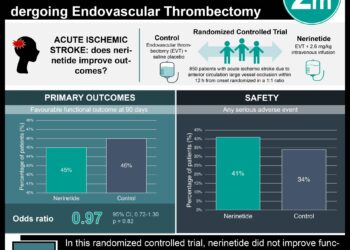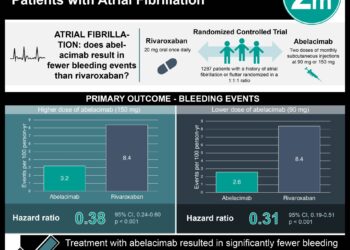Remote ischemic conditioning associated with better neurologic function in patients with acute moderate ischemic stroke – the RICAMIS trial
1. In this randomized clinical trial, among 1893 patients with acute moderate ischemic stroke, significant improvement in neurologic function at 90 days was seen in the remote conditioning group in comparison to usual care.
2. The number with excellent functional outcome at 90 days was 582 in the intervention group and 566 in the control group, with a risk different of 5.4%.
Evidence Rating Level: 1 (Excellent)
Study Rundown: There has been increasing evidence surrounding the neuroprotective mechanism of remote ischemic conditioning (RIC) which has been shown to reduce brain infarction and improve neurological outcomes for patients with acute ischemic stroke (AIS). However, there has been a lack of robust evidence for the neuroprotective effect of RIC in patients with AIS due to different RIC procedures, small sample sizes and heterogeneity of patients with a spectrum of neurological deficits. Hence, the objective of this study was to explore the efficacy of RIC for acute moderate ischemic stroke (AMIS). This randomized controlled trial was conducted at 55 hospitals in China between 2018 and 2021 and included a total of 1893 patients with AMIS. Within 48 hours after symptom presentation, participants were randomly assigned to receive treatment with RIC for 10 to 14 days in addition to guideline-based treatment, or guideline-based treatment alone. The primary endpoint was excellent function outcome at 90 days. Among the 1893 eligible patients with AMIS who were randomized, a total of 1776 (93.8%) completed the trial. The proportion of patients that experienced adverse events in the RIC group compared with the control group was 6.8% vs 5.6%, respectively. In comparison to previous studies where the specific population was less targeted, a strength of this study was that the target population was specifically defined as patients with an acute moderate ischemic stroke that had symptom onset within the first 48 hours. A limitation to this study was the lack of blinding of the assigned treatment to participants and physicians due to an open-label product design.
Click to read the study in JAMA
Click to read an accompanying editorial in JAMA
In-Depth [randomized controlled trial]: A total of 1893 patients (mean [SD] age, 65 [10.3] years; 606 women [34%]), from 55 hospitals in China were enrolled between December 2018 and April 2021 and randomized to either the RIC group (n=922) or the control group (n=971). A total of 1776 patients (93.8%) completed the trial. At 90 days, the proportion of patients with an mRS score of 0 to 1 at 90 days was 582/863 (67.4%) in the RIC group and 566/913 (62.0%) in the control group (risk difference, 5.4% [95% CI, 1.0%-9.9%]; odds ratio, 1.27 [95% CI, 1.05-1.54]; P=.02), and a risk ratio of 1.17 (95% CI, 1.03-1.32; P = .02). The OR remained significant after adjustment for prespecified prognostic variables (OR, 1.41 [95% CI, 1.14-1.74]; P = .002). The proportion of patients that experienced adverse events was 6.8% (59/863) in the RIC group and 5.6% (51/913) in the control group.
Image: PD
©2022 2 Minute Medicine, Inc. All rights reserved. No works may be reproduced without expressed written consent from 2 Minute Medicine, Inc. Inquire about licensing here. No article should be construed as medical advice and is not intended as such by the authors or by 2 Minute Medicine, Inc.







